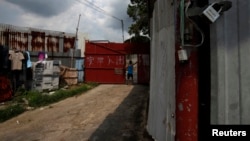The crisis in Syria has sparked debate in Europe and the United States about what to do with the millions of people fleeing the violence and alleged human rights abuses in the war torn Middle Eastern nation. But the plight of the refugees has not yet impacted Asia. While Hong Kong is at least a temporary home to thousands of asylum seekers, only one Syrian has reportedly applied for residency in the city.
Roland Vogt, an international relations professor at the University of Hong Kong, said relatively few people come to Hong Kong seeking asylum.
“The number is very limited, of refugees that come here, and the ones that have been granted asylum are very small. This is partly because Hong Kong is away from the hot spots that have produced a large number of refugees over the last few years, but it is also indicative of a restrictive policy in Hong Kong,” said Vogt.
There are more than 10,000 asylum seekers currently residing in Hong Kong, but most are trapped in legal limbo. Hong Kong is not bound to the 1951 Refugee Convention, but is bound to the Convention against Torture. That means the city government cannot expel people at risk of torture in the countries they are fleeing from. The process for getting a decision on their refugee claim can take several years, and the vast majority of individuals cannot be granted asylum, the right to work or to even permission to leave the city. Since 1992, Hong Kong has only given 31 people protection status. Victoria Wisniewski Otero is the advocacy and campaigns manager at Justice Centre Hong Kong.
“They still don’t have any legal status here in Hong Kong. Technically they are treated has illegal over stayers. They have no right to work. They have no income. The humanitarian assistance that they get is in kind, meaning that it’s not cash, and it’s not enough to put them above the poverty line. When you calculate the amount that package comes to it’s less than the poverty line here in Hong Kong,” said Otero.
Hong Kong media have reported that an international black market racket has used fraudulent asylum claims as cover for illegal workers to fill chronic labor shortages in the Hong Kong economy. These media stories, and fake asylum claims, open up refugees to more discrimination within the city. Photographer Emmanuel Serna has documented the lives of refugees living in Hong Kong New Territories. Most are from India, Vietnam, Indonesia and Africa and live on animal farms turned into slums by enterprising farmers.
“They complain, because you see, they choose Hong Kong, because you see they were thinking, it is a rich city, and it would be easy for them to find a job. But you see they are just waiting, they cannot work. They complain. Most of them want to leave Hong Kong,” said Serna.
While refugees already in Hong Kong struggle to get by, the Syrian refugee crisis has sparked an increase in local donations to charities. Oxfam Hong Kong reopened its Syrian crisis donation account, and Crossroads Foundation, another non-profit group, said it has seen an increase in its donations.




